Wrap-Up of Global Public Opinion on Issues that Defined 2020

Dina Smeltz, Craig Kafura, Karl Friedhoff, Brendan Helm, and Alexander Hitch document the ups and downs of the public mood, sharing highlights of their 2020 research.
What a year it’s been – and the Chicago Council Survey team has documented the ups and downs of the public mood here with some annual highlights. To start the year, the United States assassinated Iranian General Qasem Soleimani with a drone strike on January 3, initiating a sharp increase in tensions and only narrowly avoiding a larger escalation. Just a month later, President Trump was acquitted by Congress after being impeached by the House of Representatives in late 2019. In June, mass protests erupted in the United States, and several other countries, following the murder of George Floyd at the hands of US police. And, of course, the COVID-19 pandemic spread across the world, leading to the deaths of at least 1.6 million people, the crash and rebound of the US stock market, and the lockdown of roughly half of the world’s population.
Notwithstanding the tumultuous state of the world, it has been an exciting year for the Chicago Council Survey, as the public opinion team has gathered data in the United States and abroad on what people think about the pressing issues facing the world. Enjoy some highlights from our work this year and have a safe holiday season!
September 17, 2020 | Divided We Stand: Democrats and Republicans Diverge on US Foreign Policy
After a year of events unprecedented in recent memory, and in the midst of one of the most contentious election cycles in US history, the Chicago Council team surveyed Americans on their perceptions of US foreign policy and how they think the United States should approach the world. Conducted in July, the United States was experiencing its second surge of COVID-19 cases and Joe Biden had already become the presumptive nominee for the Democratic party.
Drawing on the feelings of Americans after 4 months of pandemic, it was clear that divisions had hardened. In particular, the data revealed that Republicans and Democrats drew different lessons from the pandemic. While 80 percent of Democrats responded that COVID-19 had shown that the United States should collaborate and cooperate with other countries to solve global issues; a majority of Republicans (58%), however, responded that this crisis has shown that the United States needs to be self-sufficient as a nation so we don’t need to rely on others.
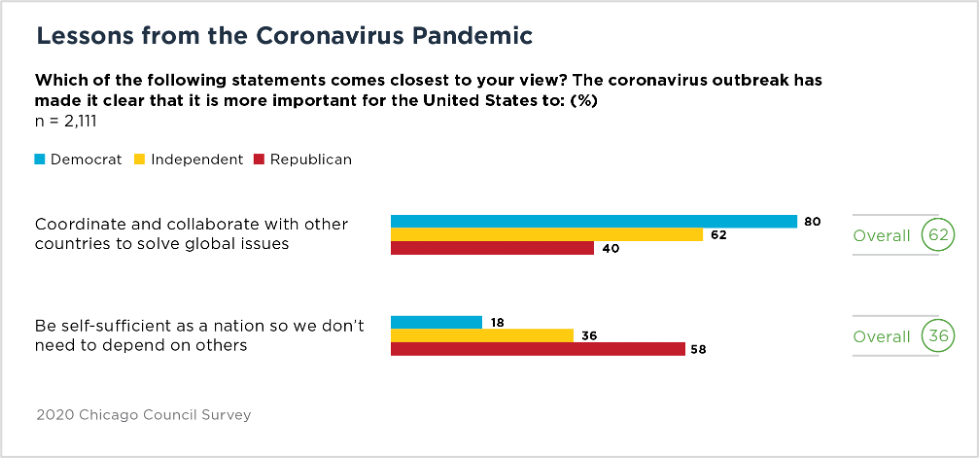
However, there was also a surprising amount of agreement and static opinion on key issues. American desire to be engaged in the world remained, with 68 percent saying that it will be best for the future of the United States if it takes an active role in world affairs. This bipartisan consensus extended to support for maintaining alliances, as well as a positive outlook on international trade and globalization.
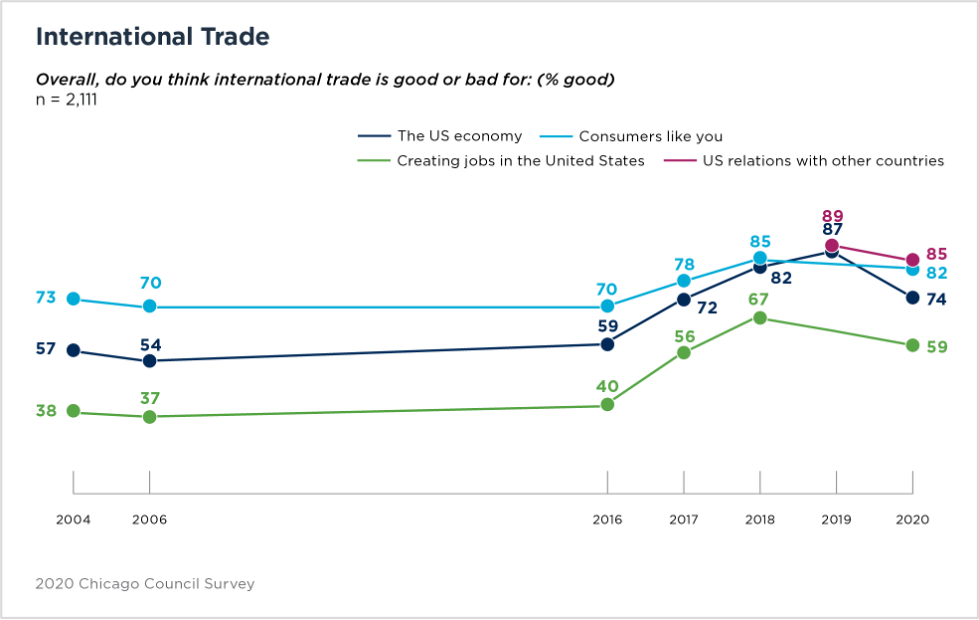
The years of the Trump administration have seen significant changes in public opinion. Whether or not Trump’s actions were a cause, support for trade grew significantly, and divisions around immigration and climate change grew to new heights. As Joe Biden assumes the Oval Office, he will inherit a slew of serious problems; not just the task of guiding the United States out of the COVID-19 pandemic, but also changing the course of US foreign policy after the Trump administration.
Read more from Divided We Stand: Democrats and Republicans Diverge on US Foreign Policy
December 19, 2020 | Republicans, Democrats Split on Increasing US Defense Budget
The size of the US defense budget has been a point of controversy among some Americans, as they criticize the massive amount of money being funneled into the US military and national security projects. Although the Senate joined the House in approving the 2021 National Defense Authorization Act, which allocates $740.5 billion in defense appropriations, President Trump vetoed the bill, citing issues with sections of the bill concerning liability for tech companies, protection of US monuments, and the withdrawal of US troops stationed abroad. The 2020 Chicago Council Survey shows that a plurality of Americans overall (37%) prefer to maintain the level of the defense budget, but when looking at partisan breakdowns, a plurality of Democrats prefer to cut the defense budget (43%) while Republicans prefer to maintain (44%) or expand it (40%).
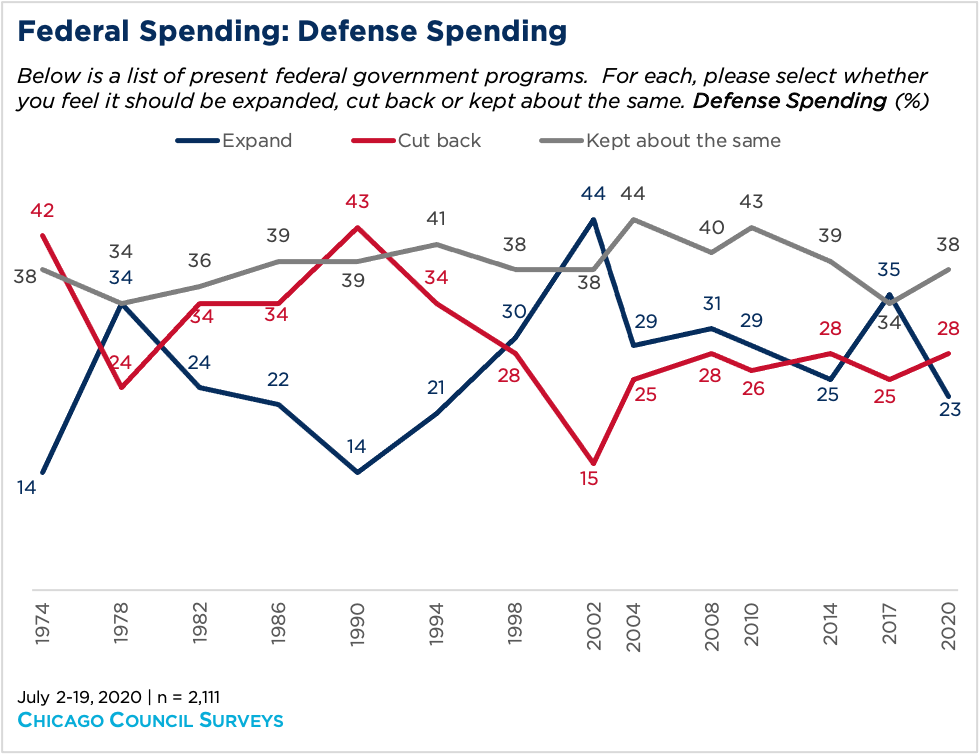
Read more about American opinion on defense spending.
October 13, 2020 | Do Republicans and Democrats Want a Cold War with China?
One of the signature policies of the Trump administration has been its aggressive trade dispute with China, among other hawkish policies. More recently, Trump has aimed his rhetoric at placing the blame for the COVID-19 pandemic squarely on China. At the same time, public opinion data has registered a significant change in the way Americans perceive China. General sentiments toward have fallen to the lowest level in Chicago Council history, and the greatest proportion of Americans since the 1990s said that the development of China as a world power is a critical threat (55%). While Democrats prefer to cooperate and engage with China (60%) and Republicans prefer to actively limit China’s growth (64%), both party supporters seem to have taken a more negative turn toward Beijing.
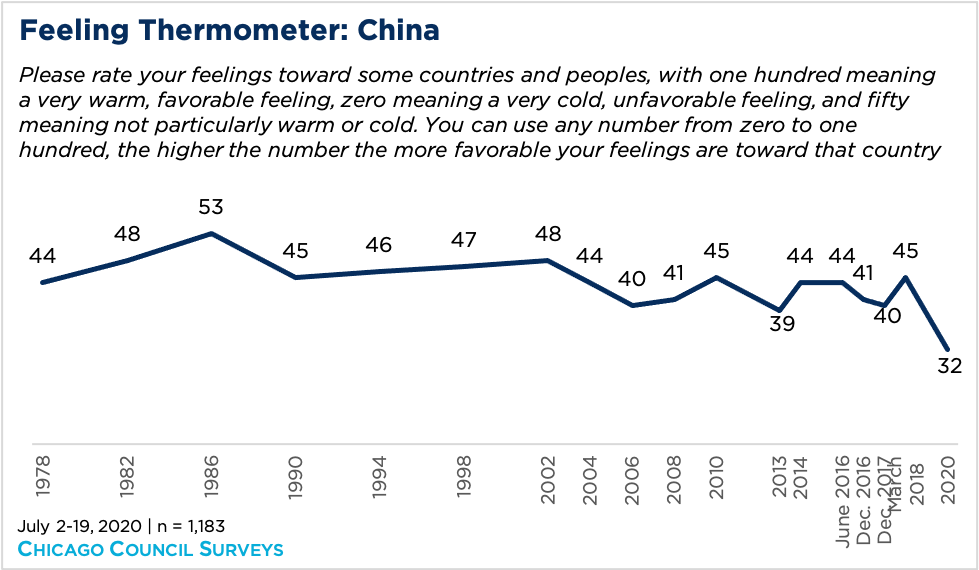
Read more about whether Republicans and Democrats want a Cold War with China
October 19, 2020 | Americans Positive on South Korea Despite Trump’s Views on Alliance
Another alliance strained during the Trump administration is the US-South Korea bilateral relationship. President Trump has engaged in a campaign to pressure Seoul to significantly increase their payments to the US for hosting US troops there, and has more broadly questioned the value of the United States’ alliance with South Korea. However, despite these actions and rhetoric, American sentiments toward South Korea are at an all-time high. Likewise, the view of South Korea as a fair trader is held by bipartisan majorities (68% overall), and willingness to defend South Korea in the event of a North Korean invasion is among its highest level ever (58% overall).
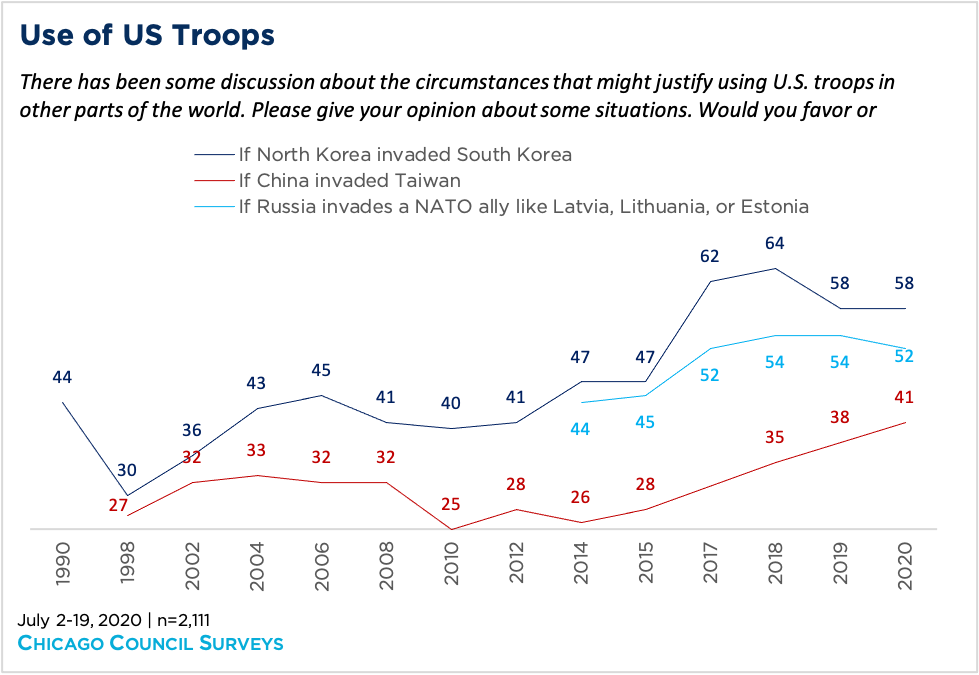
Read more about American views on South Korea
October 6, 2020 | US Experts Anticipate a Future Decline for Russia Among the Great Powers; Consider China a Shifting and India a Stable Friend to Russia
Amid faltering economic prospects, the rise of China, and continued sanctions from the West, Russia is facing a difficult set of circumstances. The Chicago Council Survey teamed up with Tufts University to poll American experts on the US-Russia relationship about the future of Moscow’s influence and military strength. Experts predict that each of these dimensions will decline over the next two decades. Moreover, they expect Russia’s relationship with the United States to remain cold and its relationship with China to worsen over the coming decades, while its relationship with India is expected to remain strong.
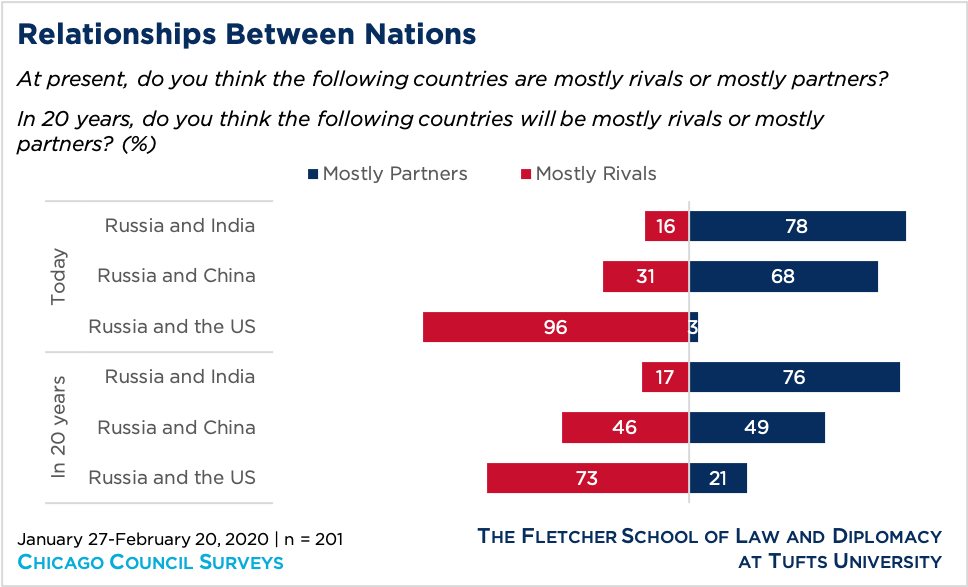
Read more about Russia’s declining influence and its international relationships
August 12, 2020 | From an Urban-Suburban-Rural “Divide” to Convergence?
The 2016 presidential election revealed a stark divide between Americans living in urban, suburban, and rural environments. Prior to the 2019 survey, data from the past Chicago Council surveys showed that people in each of these geographies held different beliefs about US foreign policy and how the United States should engage with the world. But, the 2019 Chicago Council survey showed a convergence in opinion related to international trade, the US economy, and climate change. While divisions still remain on issues like immigration, the changing tide of public opinion in different regions of the United States may have broader implications for the policy landscape in the United States.
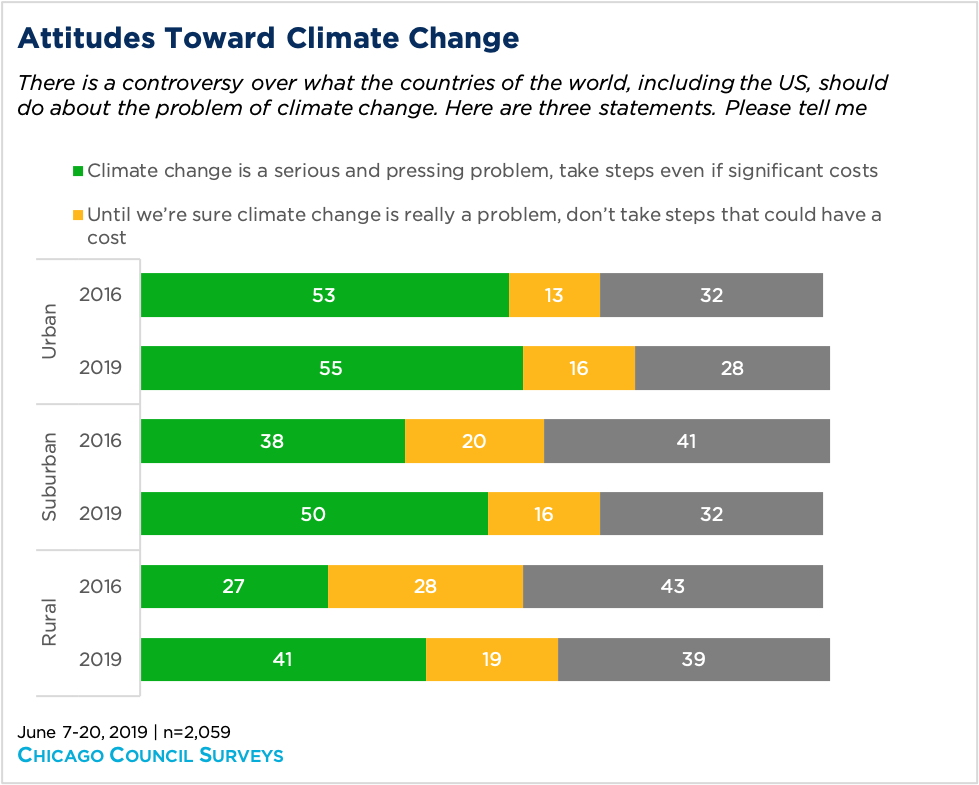
Read more about the opinions of Americans in urban, suburban, and rural environments.
August 12, 2020 | Troop Withdrawal Likely to Undermine South Korean Public Support for Alliance with United States
Routine negotiations over the Special Measures Agreement (SMA) – wherein the United States and South Korea agree on the cost of housing US troops in South Korea – became a controversy this year as the Trump administration increased their asking price by more than five times compared to 2019. Despite concerns that this would affect South Korean opinion of the United States, polling from June 2020 indicated that South Koreans remained positive about the US-South Korean alliance as well as the housing of US troops in South Korea. However, the data also indicated that even a partial withdrawal of US troops could undermine South Korean confidence in the United States’ commitment.
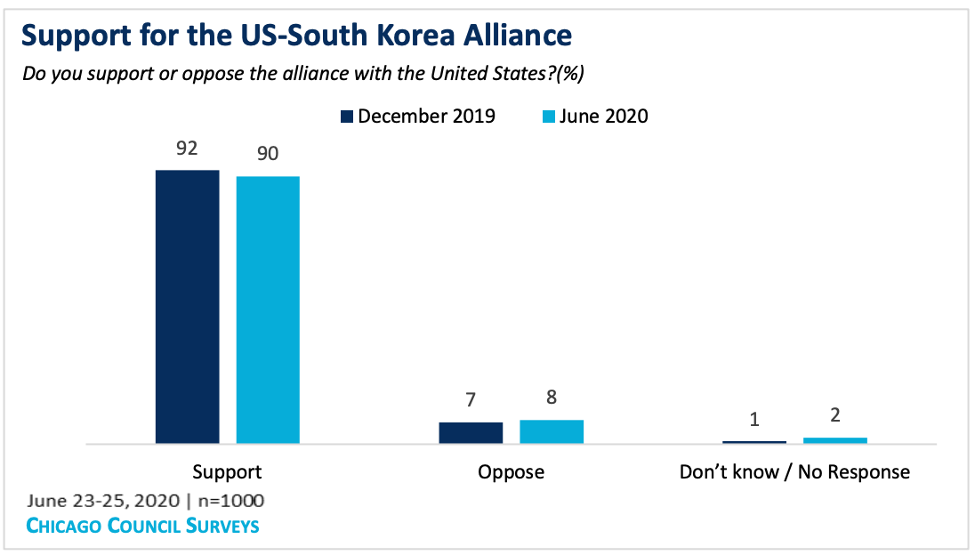
Read more about South Korean opinion surrounding the Special Measures Agreement.
March 31, 2020 | Majority of Iranians Oppose Development of Nuclear Weapons
During the Trump administration, the US-Iranian relationship has been further damaged by the decision to drop out of the Iran nuclear deal (Joint Comprehensive Plan of Action) as well as the killing of Iranian General Qasem Soleimani. A January survey in the United States, conducted shortly after this assassination, showed that majorities of Americans are willing to rejoin the JCPOA (66%), engage in diplomacy (85%), or institute further sanctions (77%) if Iran restarts development of nuclear weapons. But, a survey conducted in Iran in last 2019 showed that a majority of Iranians support a peaceful nuclear program (90%) while a majority opposes the nuclear weapon program (59%).
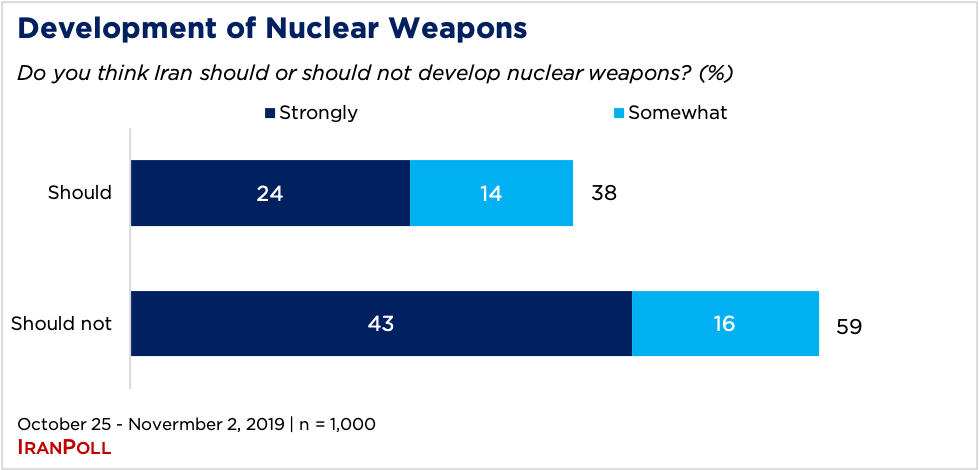
February 26, 2020 | With Tensions Receding, Americans Lose Fear of North Korea
Over the last years, tensions between the United States and North Korea have ebbed and flowed as Kim Jong-Un has accelerated his country’s nuclear program, while at the same time Donald Trump has attempted to engage in personal diplomacy with the North Korean leader. A January Chicago Council survey of Americans revealed that while the perception of threat from North Korea’s nuclear program has diminished, the broader menu of policy preferences has remained static. Americans broadly support sanctions (73%) and cyberattacks on North Korean nuclear production facilities (60%), but oppose more direct military action like airstrikes (57% oppose) or sending troops (67% oppose).
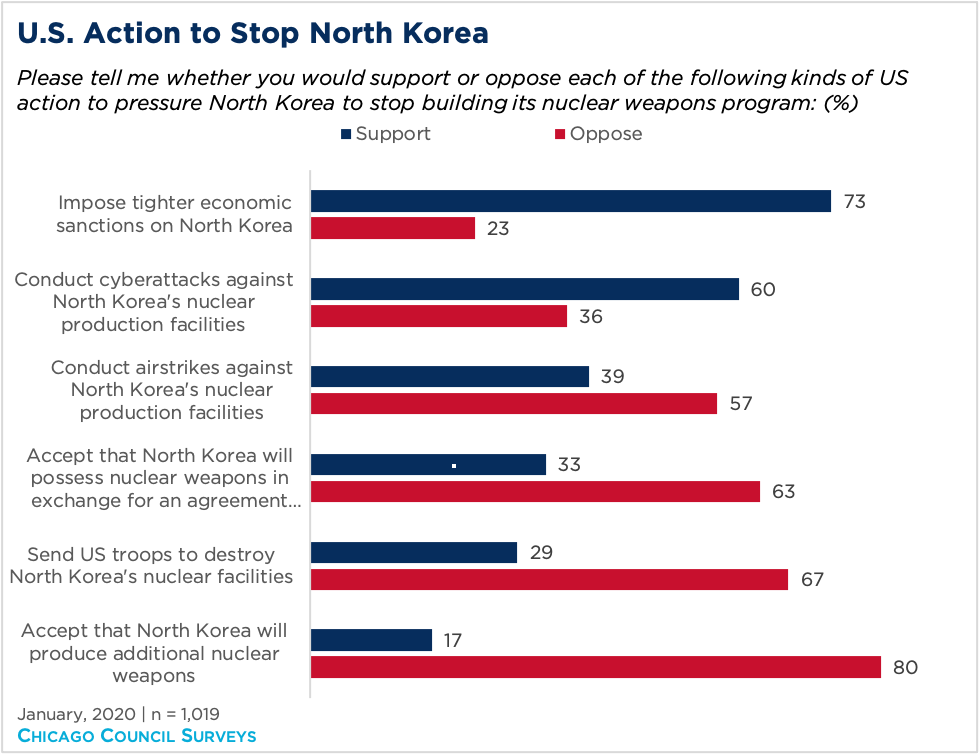
Read more about American opinion on North Korea.
February 10, 2020 | American Public Support for US Troops in Middle East Has Grown
One of the large debates over the last election cycle has been how to deal with the continued presence of US troops in the Middle East, nearly 20 years after the events of 9/11 and the ensuing military interventions in Iraq and Afghanistan. Termed ‘endless wars,’ much criticism has been levelled at these engagements, and many presidential candidates vowed to end American involvement in these conflicts. But, a January Chicago Council survey revealed that American public opinion does not reflect this debate. A majority of Americans (74%) want to maintain (45%) or increase (29%) the US military presence in the Middle East while further majorities support long-term US basing in Iraq (55%) and Kuwait (57%). At the same time, two-thirds of Americans say that the wars in Iraq (67%) and Afghanistan (65%) were not worth fighting.
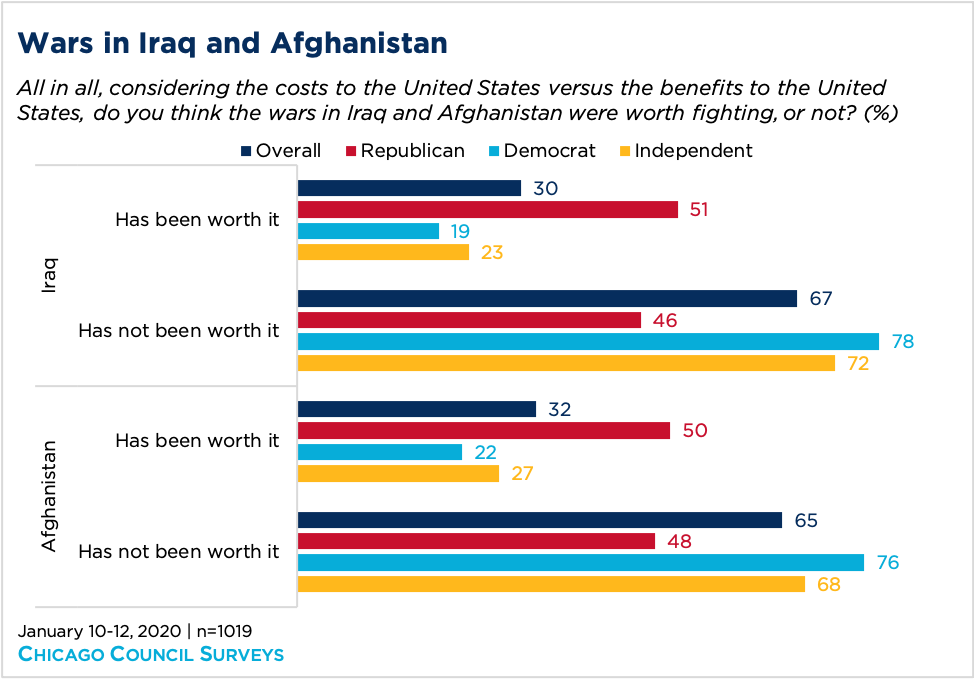
Read more about American opinion on US troop presence in the Middle East.
February 4, 2020 | OK, Boomer: Youth Hesitant to Use Force, Shun US Exceptionalism in Foreign Policy
Although partisan divisions receive the most scrutiny, generational divisions have proliferated in recent years as the young and old have developed divergent foreign policy preferences. Now that younger generations are entering positions of power–with the presidential race seeing two Millennials in Pete Buttigieg and Tulsi Gabbard—their policy preferences may become more mainstream. The 2019 Chicago Council survey revealed that younger generations are less likely to want the United States to take an active role than older generations, and are less likely to support the use of military force. And, regarding the perception of threats, younger Americans are more likely to be concerned about things such as climate change, while older Americans see threats in international terrorism and large numbers of immigrants coming into the country. Perhaps most telling is that Millennials are the only generation in which a majority says that the United States is no greater than other nations (57%).
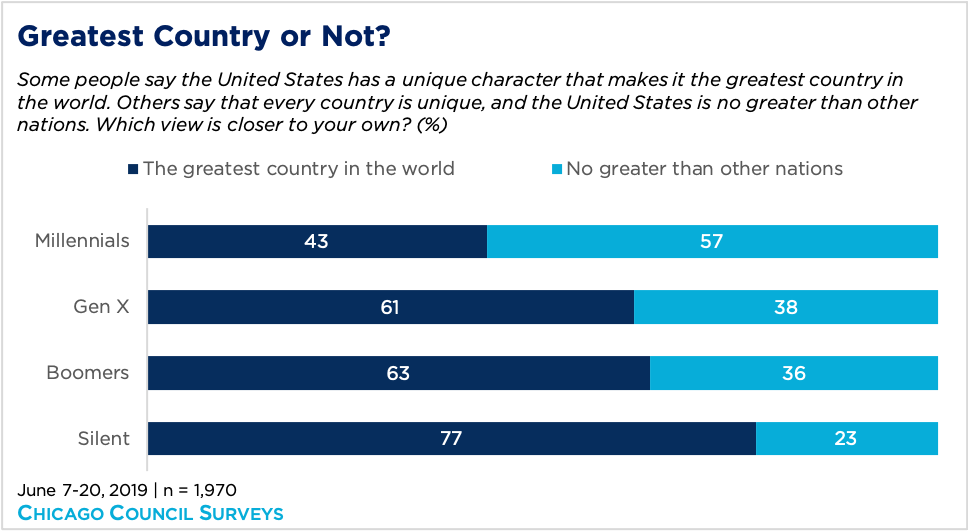
Read more about generational differences in the United States.
January 23, 2020 | Americans Feel Less Safe after Killing of Soleimani
On January 3, the United States conducted a drone strike which killed a top Iranian General, Qasem Soleimani. This assassination sent shock waves through Iran, which vowed to retaliate, and ultimately conducted a missile strike on a military base housing US troops in Iraq. Ultimately, the situation deescalated, but Americans were left concerned about the prospect of an Iranian attack closer to home. A Chicago Council Survey conducted in January, just days after the drone attack, found that a plurality of Americans (47%) believed the killing made the United States less safe. Beyond this event, Americans generally feel more of a threat from Iran’s nuclear program (61% critical threat) than their influence in the Middle East (50% critical threat).
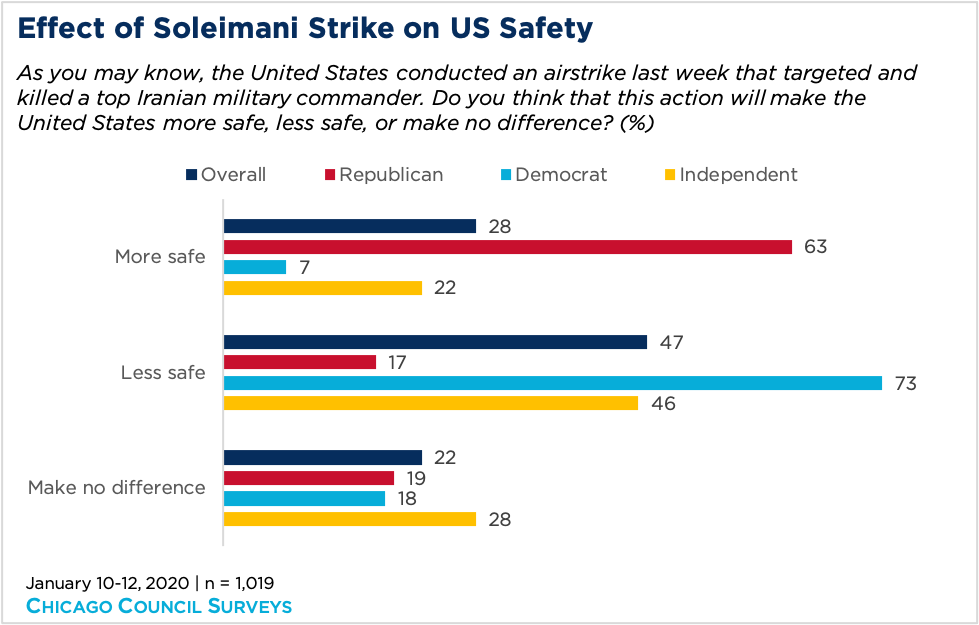
Read more about American opinion following the drone strike on General Soleimani.









